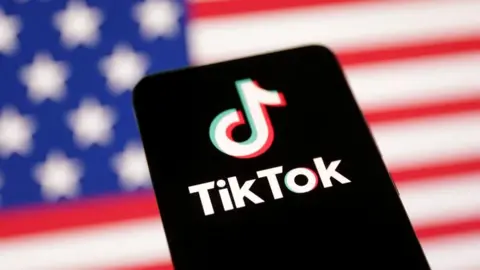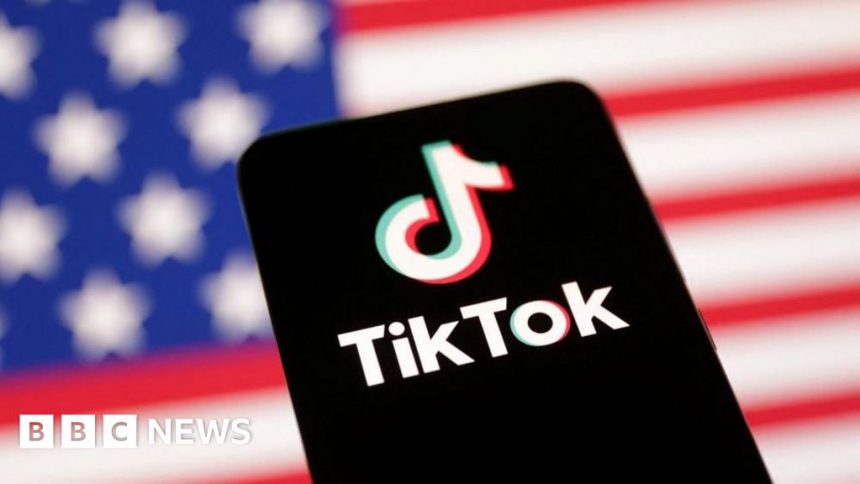TikTok to make final plea at Supreme Court against US ban
 Reuters
ReutersTikTok will appear before the US Supreme Court on Friday in a last-ditch effort to overturn a ban, in a case testing the limits of national security and free speech.
The popular social media platform is challenging a law passed last year ordering the firm to be split from its Chinese owner or be blocked from the US by 19 January.
The US government is arguing that without a sale, TikTok could be used by China as a tool for spying and political manipulation.
But TikTok rejects that claim, arguing it has been unfairly targeted and the measure violates the free speech of its some 170 million American users.
Lower courts have sided with the government, but the case was complicated last month when President-elect Donald Trump weighed in on the dispute and asked for the enforcement of the law to be paused to grant him time to work out a deal.
Analysts have said it was not clear what the Supreme Court will decide, but that reversing the prior ruling – even with a future president’s blessing – would be unusual.
“When you have a real government interest pitted against a real constitutional value, it ends up being a very close case,” said Cardozo School of Law professor Saurabh Vishnubhakat.
“But in such close cases, the government often gets the benefit of the doubt.”
A decision by Supreme Court could be made within days.
Congress passed the law against TikTok last year with support from both the Democratic and Republican parties. The moment marked the culmination of years of concern about the wildly popular platform, which is known for its viral videos and traction among young people.
The legislation does not forbid use of the app, but would require tech giants such as Apple and Google to stop offering it and inhibit updates, which analysts suggest would kill it over time.
TikTok is already banned from government devices in many countries, including in the UK. It faces more complete bans in some countries, including India.
The US argues that TikTok is a “grave” threat because the Chinese government could coerce its owner, ByteDance, to turn over user data or manipulate what it shows users to serve Chinese interests.
Last December, a three-judge appeals court decision upheld the law, noting China’s record of acting through private companies and saying the measure was justified as “part of a broader effort to counter a well-substantiated national security threat posed” by the country.
TikTok has repeatedly denied any potential influence by the Chinese Communist Party and has said the law violates the First Amendment free speech rights of its users.
It has asked the Supreme Court to strike down the law as unconstitutional, or order its enforcement to be halted to enable a review of the legislation, which it said was based on “inaccurate, flawed and hypothetical information”.
Trump is set to take office the day after the law would come into force.
He had called for banning the app in the US during his first term, but changed his tune on the campaign trail.
The brief that Trump’s lawyers filed late last month did not take a position on legal dispute, but said the case presented “unprecedented, novel, and difficult tension between free-speech rights on one side, and foreign policy and national-security concerns on the other”.
Noting his election win, it said Trump “opposes banning TikTok” and “seeks the ability to resolve the issues at hand through political means once he takes office”.
The filing came less than two weeks after Trump met TikTok’s boss at Mar-a-Lago.
One of the president-elect’s major donors, Jeff Yass of Susequehanna International Group, is a big stakeholder in the company.
However, Trump’s nominee to serve as secretary of state, Florida Senator Marco Rubio, is in favour of banning the platform.
Investors who have expressed interest in buying the TikTok include Trump’s former Treasury Secretary Steven Mnuchin and former LA Dodgers owner Frank McCourt.
Attorney Peter Choharis, who is part of the Foundation for Defense of Democracies think tank in Washington, which filed its own brief supporting the US government’s case, said it was hard to predict what the court – which has a conservative majority – would do, noting that several recent court decisions have overturned longstanding precedent.
But he said even if Trump was granted the opportunity to try to work out a deal, he expected a ban eventually.
“I don’t see any president, including future President Trump, being able to resolve this in a way that’s satisfactory for US national security because I don’t think ByteDance will agree to it,” he said.
The prospect of losing TikTok in the US has prompted outcry from many users, some of whom filed their own legal action last year.
In their filing they said the decision that TikTok could be shuttered “because ideas on that platform might persuade Americans of one thing or another – even of something potentially harmful to our democracy – is utterly antithetical to the First Amendment”.
Other groups weighing in on the dispute include the American Civil Liberties Union and Freedom of the Press Foundation, which argued that the US had failed to present “credible evidence of ongoing or imminent harm” caused by the social media app.
Mr Choharis said the government had a right to take measures to defend itself, arguing that the fight was not “about speech” or “content” but about the Chinese government’s role.
“It’s about control and how the Chinese Communist Party specifically, and the Chinese government more generally, pursue strategic aims using many internet firms and especially social media companies – specifically including TikTok,” he said.







